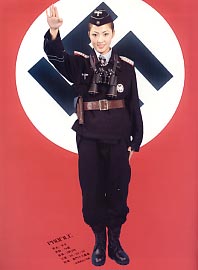Extreme Fashion Statements

Totalitarianism has become something of a trendy look in recent years. From the nauseating pimping of Che Guevara’s likeness by the pseudo-socialist band Rage Against the Machine, to t-shirts bearing the image of Chairman Mao, to the whole bizarre “Soviet Kitsch” thing, Communism is a hot statement. A couple of things are interesting about this. First, no one seems to be offended by the fact that these images reflect a political ideology that was the cause of the deaths of between 60 and 85 million human beings (and continues to be so in places like Nepal and North Korea). And pointing out this fact in the presence of commie-clad hipsters will only get you written off as a hopeless right-wing nut. Secondly, no assumptions are usually made as to the political affiliations of the people wearing this stuff: It is not normally assumed that you’re a member of the Revolutionary Communist Party just because you’re wearing a Mao shirt. The reaction one gets in the U.S. to wearing Nazi gear is, shall we say, a bit more interesting. Back in the 70’s, a few people in the punk scene got away with wearing swastikas as a shock tactic. Since them, the display of any sort of Third Reich imagery in public is defiantly a big no-no. If you do, you will get a lot of justified criticism (and quite possibly an ass-kicking) from people who feel you are in some way supporting the atrocities of the Nazi regime. It will also likely be assumed that you are in some way supportive of the white supremacist cause.
But it’s not like that everywhere. In Asia, “Nazi Kitsch” is about as popular as Soviet kitsch is here. It is not uncommon in Hong Kong to see young men wearing t-shirts bearing the likeness of Hitler, as well as Nazi-themed karaoke bars (!) and magazines devoting photo essays to hot girls in SS gear (see photo above). The most likely explanation of the difference in attitudes is probably Asia’s almost total lack of Jewish population. Without a group of persons to act as a personal reminder of the unique horror of the Holocaust, most Asians don’t consider the Nazis to be any worse than say, the Turks who launched a campaign of genocide against the Armenians in the early 1900’s. Although considering the atrocities committed by the Japanese army in China during WWII, wearing a t-shirt bearing an Imperial Japanese crest in Hong Kong would probably engender a reaction similar to that of wearing a swastika armband here.
My point is that both cultures are inconsistent on this topic. If genocide is too offensive a subject to be reduced to the frivolity of an ironic t-shirt, than it shouldn’t matter weather a German or a Russian carried out that genocide.

0 Comments:
Post a Comment
<< Home